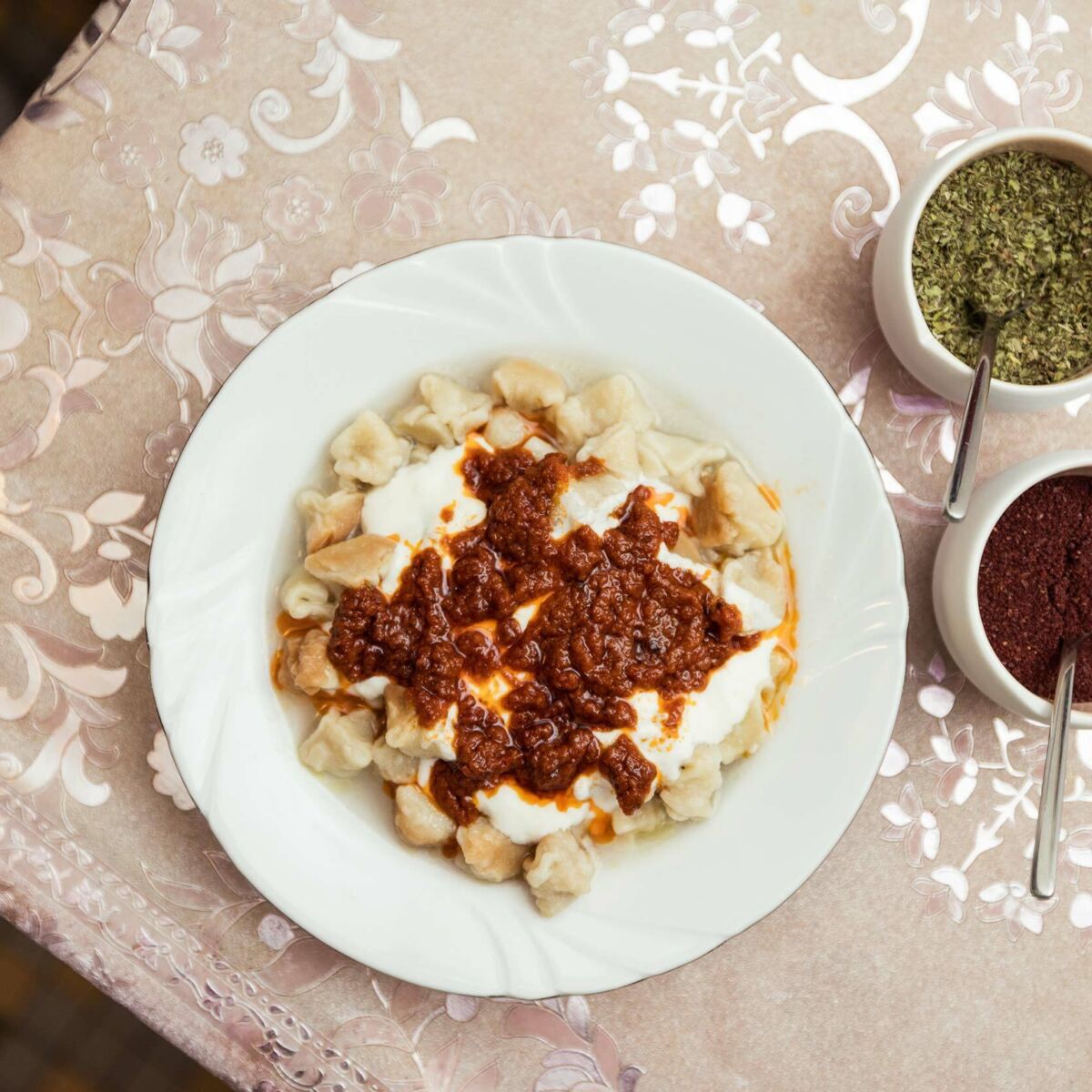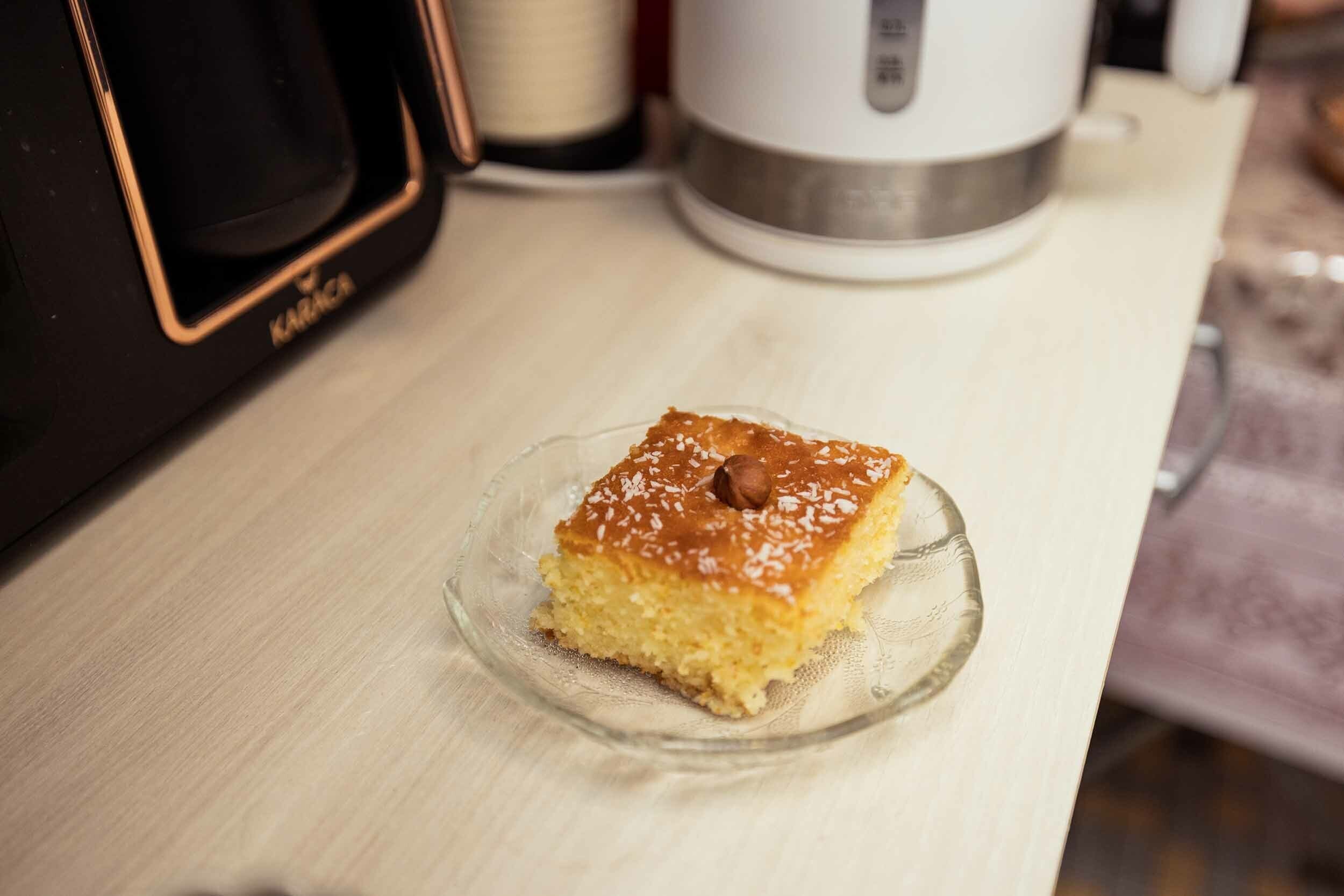
Ayça Kuyumcuoglu spends every holiday with her relatives in Turkey. When she returns to Switzerland, the trainee lawyer brings back new memories – and some of her grandmother’s recipes. Examples include Kuyumcuoglu-style Mantı and Revani.
The Mantı in Ayça Kuyumcuoglu’s freezer were from her August trip to Ankara. Part of the Kuyumcuoglu family sat at a table in the Turkish capital, with a very thin roll of dough made of flour, water, eggs and salt in front of them. Together they prepared these Turkish dumplings under the guidance of their grandmother. They cut the dough into small rectangles, then carefully filled each piece with pre-cooked minced beef seasoned with onion, mint and nutmeg and pressed the four corners together with care. Then they put the Mantıs in the oven. “This makes them harder and preserves them for longer”, explains Ayça Kuyumcuoglu in her kitchen in Bassersdorf. “The preparation process is very elaborate, but also very beautiful.” Back in Ankara, the Kuyumcuoglus sat together like this for almost a whole day.
There are probably as many varieties of Mantı as there are families in Turkey. Some of them use dumplings the size of Italian tortellini, while others skip the filling altogether. The rules for these Mantıs have been set by her 85-year-old grandmother: they have to be tiny. That is how she was taught in her hometown of Kayseri. This industrial town at the foot of the dormant Erciyes volcano, a five-hour drive from Ankara, is where the family originally hails from. “About ten Mantıs should fit on a single tablespoon”, clarifies Ayça Kuyumcuoglu with respect to her grandmother's definition of “tiny”.
«One day I would like to have a flat with a big kitchen.»
Ayça Kuyumcuoglu boils water, salts it and adds the Mantı. “While we wait, we can prepare the sauces.” The dumplings need to cook for 10 to 15 minutes, depending on their size. She serves Mantı with two sauces, yoghurt and butter tomato. Kuyumcuoglu heats butter in a small pot and adds olive oil from a Turkish glass bottle, tomato paste and hot paprika powder. Another glug of olive oil – “You can never have too much” – and a generous tablespoon of the Mantı cooking water. Now it is time for the yoghurt sauce. For this, Kuyumcuoglu mixes natural yoghurt, freshly minced garlic and a pinch of salt in a small glass bowl. “In Turkey, everyone makes the yoghurt themselves.”
Ayça Kuyumcuoglu is a family person. When she takes a holiday, she spends it with her family in Ankara. It is important for her to see all her relatives “a little bit so they do not get offended”. In Switzerland, her parents live in the neighbouring village. Not only does she return with new memories from her second home but also ornate crockery, Turkish coffee – and always homemade and dried Mantı. “I am becoming more and more like my grandmother”, says Kuyumcuoglu. “One day I would like to have a flat with a big kitchen.”
«For dessert, I prepared Revani, Turkish cake», she says. «We always have it on special occasions or when we have a visitor.»
In Bassersdorf, it is time to dress the food and eat. Ayça Kuyumcuoglu places the cooked Mantı on a deep plate with a decilitre of cooking water. She spreads the yoghurt sauce generously over the dumplings and adds dabs of the butter-tomato sauce. She adds a little dried mint and sumac for a perfect understated freshness to the dish.
“For dessert, I prepared Revani, Turkish cake”, she says. “We always have it on special occasions or when we have a visitor.” In Turkish culture, cooking a lot is part of hosting guests. She slices the soaked cake, puts a hazelnut on each piece and hands it to her guests. With it, she pours bitter Turkish coffee, which has settled properly at the bottom of the cup.
A few days later, Ayça will return to her grandmother’s house in Ankara. Every Sunday since her last visit, she has called her. “She is always very happy and has a lot to say.”

Ingredients
Ingredients for the syrup:
400 g sugar
650 ml water
Lemon juice
Ingredients for the dough:
4 eggs
200 g sugar
1 pack of vanilla sugar
180 ml cooking oil, e.g. sunflower oil
220 ml natural yoghurt
170 g semolina
130 g flour
1 pack of baking powder
Kuyumcuoglu-style Revani
Step 1
Put the sugar and water in a saucepan. Simmer the syrup over medium heat for ten to twelve minutes. Squeeze some lemon juice into the water. Leave the syrup to cool at room temperature while you prepare the dough.
Step 2
Cream the sugar and eggs together. Add the vanilla sugar, oil and yoghurt and mix further. Finally, stir in the semolina, flour and baking powder. Mix the ingredients until they form a smooth dough. Bake in a shallow tin for 30 minutes at 175° fan.
Step 3
Leave the airy cake to cool for ten minutes. Drizzle the sugar syrup over the dough and put the Revani in the fridge.
Step 4
To serve, sprinkle the cooled cake with a handful of coconut flakes. Slice the cake and top each slice with a whole hazelnut.
Ayça Kuyumcuoglu’s tip:
«When you pour the syrup over the dough, the syrup must be cold and the dough must still be warm. This helps the liquid soak in better.»
Ayça Kuyumcuoglu
has been working at Walder Wyss since September 2021. It took the trainee lawyer a while to realise she wanted to work in law. “I actually wanted to be a surgeon”, she says, “but working in hospital took a lot out of me emotionally.” After a few semesters studying law at the University of Zurich, Ayça Kuyumcuoglu’s interest grew. She was particularly interested in criminal law. After her internship at Walder Wyss, she plans to complete another one at a court or the public prosecutor’s office.